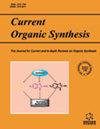Co2(CO)8 as a CO-source for Pd-catalyzed Carbonylations: An Update
IF 2.5
4区 化学
Q3 CHEMISTRY, ORGANIC
引用次数: 0
Abstract
: Palladium-catalyzed carbonylative cross-coupling reactions with various carbon monoxide (CO) sources cultivate competent routes for the synthesis of bulk and value-added chemicals. However, the practical use of this odorless, inflammable, lethal gas has always raised a concern for chemists. The attention and advancement of various CO-surrogates is surely wel-comed as a green alternative to CO-gas. However, the main concern lies in the suitability and scalability of these CO-surrogate-driven reactions. Literature showed the progress of various ways to make in-situ CO from these CO surrogates. One of the most convenient sources is using metal carbonyls which are already known to lose CO easily. Among all the kinds, Mo(CO)6 gained much popularity but its toxic nature and demand for high temperatures restricted its use. However, Co2(CO)8 is popular as a catalyst but as an in-situ CO-source reports are scarce. This low-melting CO-releaser was found effective in flourishing aminocarbonylation, alkoxycar-bonylation, and reductive carbonylation under mild conditions. This mini-review portrays the recent developments of palladium-catalyzed carbonylation reactions using Co2(CO)8 as a CO source.Co2(CO)8 作为 Pd 催化羰基化反应的 CO 源:最新进展
:钯催化与各种一氧化碳(CO)源的羰基交叉偶联反应为合成大宗和高附加值化学品提供了可行的途径。然而,这种无味、易燃、致命气体的实际使用一直是化学家们关注的问题。作为一氧化碳气体的绿色替代品,各种一氧化碳代用品的出现和发展无疑备受关注。然而,主要的问题在于这些一氧化碳代用品驱动反应的适用性和可扩展性。文献显示,利用这些一氧化碳代用品制造原位一氧化碳的各种方法都取得了进展。最方便的来源之一是使用已知容易失去 CO 的金属羰基。在所有种类中,Mo(CO)6 颇受欢迎,但其毒性和对高温的要求限制了它的使用。然而,Co2(CO)8 作为催化剂很受欢迎,但作为现场 CO 源的报道却很少。研究发现,这种低熔点 CO 释放剂在温和条件下可有效促进氨基羰基化、烷氧基羰基化和还原羰基化。本微型综述介绍了以 Co2(CO)8 为 CO 源的钯催化羰基化反应的最新进展。
本文章由计算机程序翻译,如有差异,请以英文原文为准。
求助全文
约1分钟内获得全文
求助全文
来源期刊

Current organic synthesis
化学-有机化学
CiteScore
3.40
自引率
5.60%
发文量
86
审稿时长
6-12 weeks
期刊介绍:
Current Organic Synthesis publishes in-depth reviews, original research articles and letter/short communications on all areas of synthetic organic chemistry i.e. asymmetric synthesis, organometallic chemistry, novel synthetic approaches to complex organic molecules, carbohydrates, polymers, protein chemistry, DNA chemistry, supramolecular chemistry, molecular recognition and new synthetic methods in organic chemistry. The frontier reviews provide the current state of knowledge in these fields and are written by experts who are internationally known for their eminent research contributions. The journal is essential reading to all synthetic organic chemists. Current Organic Synthesis should prove to be of great interest to synthetic chemists in academia and industry who wish to keep abreast with recent developments in key fields of organic synthesis.
 求助内容:
求助内容: 应助结果提醒方式:
应助结果提醒方式:


